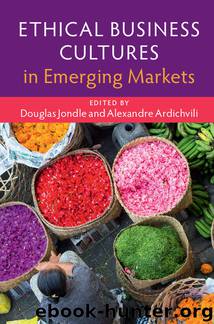Ethical Business Cultures in Emerging Markets by Douglas Jondle & Ardichvili Alexandre & Douglas Jondle & Ardichvili Alexandre

Author:Douglas, Jondle & Ardichvili, Alexandre & Douglas, Jondle & Ardichvili, Alexandre
Language: eng
Format: epub
Publisher: Cambridge University Press
Published: 2017-09-20T04:00:00+00:00
Ethical Culture in Organizations
Ethical culture in organizations is comprised of formal and informal cultural systems. Formal cultural systems include factors such as “policies (e.g., codes of ethics), leadership, authority structures, reward systems, and training programs,” while informal cultural systems refer to “peer behavior and ethical norms” (Trevino et al., 1998, 451–452). There have been developments in the ethical culture of Turkish business organizations to both formal and informal systems, mostly due to the change of expectations in local and global markets. “Societal expectations about what a corporation can and cannot do as well as should and should not do play a role in shaping CSR culture and framework in organizations” (Robertson, 2009, p. 627). Based on this approach, the stakeholder perspective is becoming more prevalent in the business culture of Turkey, and companies are paying closer attention to their interactions with their stakeholders. Turkish business organizations are now dealing with the rising pressure of civil society on their activities, particularly in relation to human rights, child labor, and working conditions (Auger et al., 2007).
Another influential factor is trust. According to the World Values Survey (2014), Turkish people have one of the lowest trust levels (reported as 11.6%) when compared to people of other countries. Public trust levels in business organizations is also very low in Turkey (GfK, 2013). In the last three years in particular, Turkish citizens have indicated that “being just and transparent” has been the most important feature of business organizations for trust and reputation (Reputation Management Institute, 2013). Hence, companies have begun to recognize “trust” and “reputation” as a crucial value in their assets and are paying attention to business ethics in order to increase their reputation level. As a result, the number of Turkish business organizations having codes of ethics has been increasing. For instance, while 53.3 percent of publicly traded companies had reported having a code of ethics in 2007 (Köseoğlu, 2007), only 23.3 percent of the 500 largest companies in Turkey had a code of ethics (Aydınlık & Dönmez, 2007), but this ratio increased to 36.4 percent in 2012 (Yılmaz, 2012). Although longitudinal studies showed that ethics training has a positive influence on organizational ethical culture (Warren et al., 2014), according to field research, only 25 percent of business organizations in Turkey had ethics training programs (IGIAD, 2013).
One of the most important ethical challenges of business culture in Turkey is the perceived notion of ethics and law, which are regarded as interchangeable by Turkish businesses and organizations (Ararat, 2008). Yet, there are so many grey areas in business life, which are not codified in law, and this lack of clarification makes ethical abuses more possible, especially against less powerful or effective parties. For example, while Turkish companies consider customer satisfaction and high-quality products as the most important values, supplier satisfaction and union relationships have the least importance (Halici & Kucukaslan, 2005). In an empirical study of Ekin and Tezölmez (1999), while Turkish managers declared that ignoring environmental issues, conducting insider trading, and accepting bribery/inconvenient
Download
This site does not store any files on its server. We only index and link to content provided by other sites. Please contact the content providers to delete copyright contents if any and email us, we'll remove relevant links or contents immediately.
Tools of Titans by Timothy Ferriss(8369)
Change Your Questions, Change Your Life by Marilee Adams(7761)
Deep Work by Cal Newport(7066)
Playing to Win_ How Strategy Really Works by A.G. Lafley & Roger L. Martin(6250)
Man-made Catastrophes and Risk Information Concealment by Dmitry Chernov & Didier Sornette(6007)
Big Magic: Creative Living Beyond Fear by Elizabeth Gilbert(5756)
Digital Minimalism by Cal Newport;(5750)
Ego Is the Enemy by Ryan Holiday(5415)
The Slight Edge by Jeff Olson(5410)
The Motivation Myth by Jeff Haden(5205)
The Laws of Human Nature by Robert Greene(5177)
Stone's Rules by Roger Stone(5081)
Tuesdays with Morrie by Mitch Albom(4770)
Eat That Frog! by Brian Tracy(4526)
Rising Strong by Brene Brown(4451)
Skin in the Game by Nassim Nicholas Taleb(4239)
The Money Culture by Michael Lewis(4198)
Bullshit Jobs by David Graeber(4179)
Skin in the Game: Hidden Asymmetries in Daily Life by Nassim Nicholas Taleb(3992)
